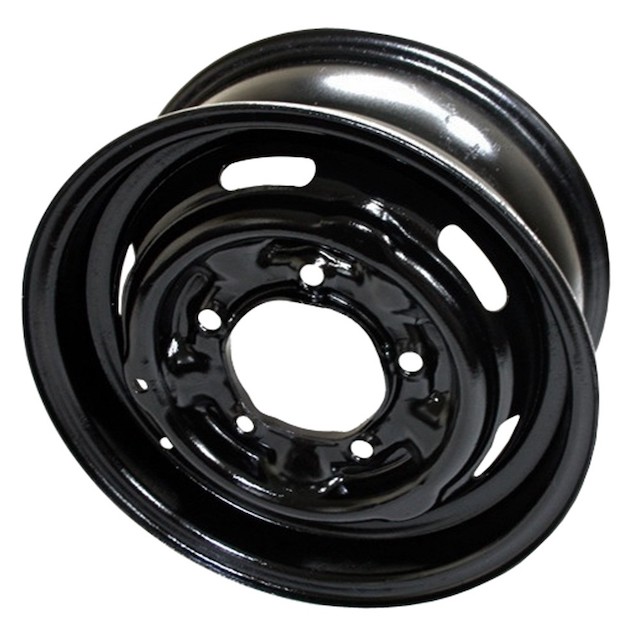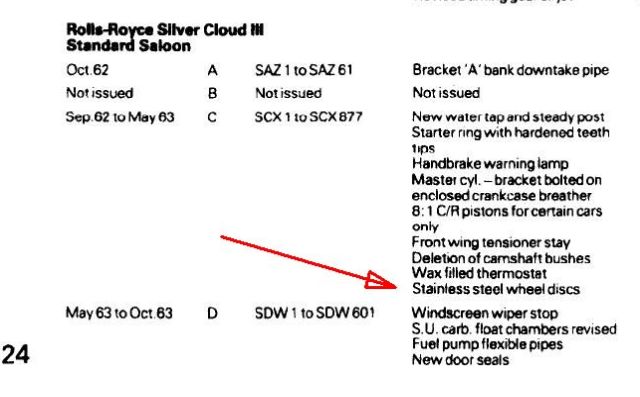| Author | Message | ||
Glen Poolen Frequent User Username: wgipps Post Number: 218 Registered: 03-2018 |
Ill post this in the Shadow as well as the Cloud forum parts so excuse the double entry. I need to find out if the stud pattern for a 1956 Cloud I is the same as a stud pattern for a 74 Shadow. Any documentation that identifies if the PCD for the cars would be great thanks. | ||
David Balfour Experienced User Username: sidchrome Post Number: 189 Registered: 02-2009 |
Hi Glen, I cannot say if the PCD is the same, but if you view the attached images, you can clearly see that the Cloud on the right and the Shadow on the left, have rims featuring a vastly different offset between the face of the rim and the hub mounting surface. That would make the rims non-interchangeable IMO. If however you just want to know the pcd because you want to manufacture a rotator for rim repairs or the like, I'd be happy to measure a Cloud rim accurately for you. Regards David B.   | ||
Glen Poolen Frequent User Username: wgipps Post Number: 219 Registered: 03-2018 |
Thanks David. Its for a set of wheel adapters that fit onto a Cloud and change the stud pattern to that of a modern day Toyota Landcruiser. The guy had them on his Cloud and they are currently for sale - I was considering buying them. So the actual thickness of the rim or the offset doesnt really matter for my purpose. I guess the best way is to take the car down and try them on for size. | ||
David Balfour Experienced User Username: sidchrome Post Number: 191 Registered: 02-2009 |
Hi Glen, Yes I see what you mean. You will probably find that the adaptor allowed the Toyota Wheel to sit with the tyre tread on the same centreline as the original wheel and tyre. If so, You might find that the same adaptor fitted to a Shadow will make the same Toyota wheel sit too far outwards, if that is your intention. Only way to know for sure is like you said, to go and try. Regards, David B. | ||
Norman Geeson Unregistered guest Posted From: 81.99.138.38 |
Glen I have missed something here, as I donít quite understand why you want to change the wheels to a Toyota version, unless it is to accomplish a tyre size change. However, what I do understand are the implications of increasing any forces on a 1956 Silver Cloud I rear axle that is already on its limits. So much so that R-R was forced into changing just about every component part to address the shortcomings. Unfortunately they never fully eliminated the issues with that chassis layout and those issues are expensive to rectify, that is if you can source the parts and know the necessary required modifications. Any extension of the road wheel overhang beyond standard will increase the stresses in both ends of the already weak 14 spline half shaft and will further increase flexing of the axle side plates. Even in their later standard form, let alone the early 1956 type, before I retired I rebuilt literally hundreds of these S1 axles. Unless you have good reason, and plenty of spare cash, I would tread very carefully around making wheel changes. (Message approved by david_gore) | ||
Philip Sproston New User Username: phil2025 Post Number: 36 Registered: 07-2006 |
Glen PCD on a cloud 5x139.7 a shadow 5x154.95 | ||
David Balfour Experienced User Username: sidchrome Post Number: 193 Registered: 02-2009 |
I measured my Cloud stud centre to centre and calculated the PCD as about 5 15/32" or 138.9 mm, which is very close to the value Philip has posted above. So I would say he is on the money. | ||
Marianne Dawson New User Username: maddy Post Number: 2 Registered: 02-2019 |
Fellow Cloud owners, I have not posted on this site before and it is my fondest desire that someone here can assist me with a question regarding wheel covers where some call them hub caps for the early Silver Cloud III series. From its initial introduction April of 1955, to what year were the wheel covers chromed and what year was stainless steel introduced. I appreciate any help with this topic. | ||
David Hughes Experienced User Username: wedcar Post Number: 106 Registered: 07-2004 |
Hello Marianne I can't help you with the exact date that the change to SS was introduced, however, the change over was made I understand toward the end of the 6 cylinder car series, your car being a V8 almost certainly would have had SS. As a colleague often says regarding Rolls Royce/ Bentley, "never say always". Regards David | ||
Christopher Carnley Unregistered guest Posted From: 109.156.42.113 |
The excellent "Original Rolls-Royce and Bentley 1946-65" by James Taylor, 1999, informs that the material was changed to stainless steel in April 1963, at B404CN, and during the SCX series. The copies are inexpensive on Amazon. (Message approved by david_gore) | ||
David Gore Moderator Username: david_gore Post Number: 3628 Registered: 04-2003 |
Marianne, You can do a quick test with a magnet: 1. Chromium-plated mild steel hubcaps will cause the magnet to stick the the hubcap with a solid "thump". 2. Stainless steel hubcaps are essentially non-magnetic and will not strongly attract the magnet although you might sense a pull if the hubcaps were pressed from type 301 grade stainless steel as this grade will slightly attract a magnet due to work-hardening of the metal during pressing of the hub cap. The difference of the two materials in magnetic attraction is large and easy to detect even by someone who has never used a magnet before. | ||
Geoff Wootton Grand Master Username: dounraey Post Number: 2195 Registered: 05-2012 |
Re: "The excellent "Original Rolls-Royce and Bentley 1946-65" by James Taylor, 1999, informs that the material was changed to stainless steel in April 1963, at B404CN, and during the SCX series." This is also confirmed, with less accuracy, in the chassis numbers booklet:  If anyone would like a copy of the chassis numbers booklet, pm me your email address. It might also be available on the technical website. | ||
Geoff Wootton Grand Master Username: dounraey Post Number: 2196 Registered: 05-2012 |
Update - it is available on the technical website: http://rrtechnical.info/ | ||
Robert J. Sprauer Frequent User Username: wraithman Post Number: 591 Registered: 11-2017 |
Hub cap vs wheelcover. Depends on the vehicle. Hub caps are exactly what they are...a cap designed to cover the stub axle, frequently used on very early cars, especially during the open wheel or spoke era. A wheel cover essentially covers the rim when the industry went to pressed steel tire rims to cover the wheel nuts as seen on SC and Shadows for example. | ||
David Balfour Experienced User Username: sidchrome Post Number: 194 Registered: 02-2009 |
Hub cap vs Wheelcover vs Wheeldisc What you say Robert is partly true, but it also depends where you are from as well as car. In Australia and the UK, a hub cap was a cap that fitted over the wheel centre. In wire wheels it covered only the hub. Later it covered most of the wheel when pressed and welded steel wheels became fashionable. In most cars it covered most of the wheel, as it did in the USA, from the 1930s on, except for maybe a 3" bit all the way around the outside. So a hubcap could be 8" in diameter on a 14" rim. These often also had trim rings added to them, to cover the entire wheel. Hubcaps that covered the entire wheel without needing a separate trim ring were referred to as wheel covers by most people, and just hubcaps in general, in Australia. I called them wheel covers, but I see Rolls-Royce also referred to wheel covers as wheel discs, which maybe a throw back to the discs of the 1930s over entire wire wheels. What is interesting about the list up above is that my 1961 SCII does have a factory handbrake warning light. | ||
Christopher Carnley Unregistered guest Posted From: 86.133.18.68 |
Also known as the "Nave Plate". (Message approved by david_gore) | ||
Robert J. Sprauer Frequent User Username: wraithman Post Number: 592 Registered: 11-2017 |
Hub cap and wheelcover are used interchangeably today when they are different. For example the wheel cover on a my 1976 Shadow is sometimes referred to as a hub cap. On my 1980 Silver Wraith II, there is an actual hub cap (aka Dog dish) and a separate trim ring, so technically there is no wheelcover. |